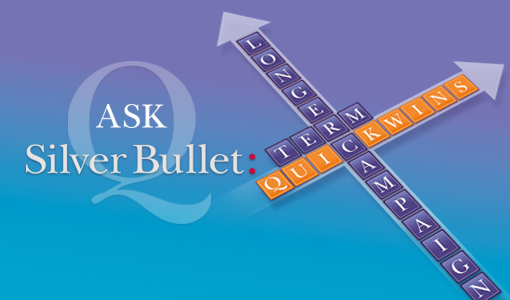11 Jul

Are ‘Quick Wins’ more effective than a longer planned campaign when marketing?
Ask Silver Bullet July 2018
With ever increasing pressure on marketing managers and agencies to deliver rapid results with restricted budgets, there is a huge temptation to invest in ‘quick wins’ or marketing techniques that deliver rapid results irrelevant of other factors.
The results, however, may not always be in the long-term interests of the company and are often more costly than a longer-term ‘slow burn’ campaign. In truth, there is no right or wrong answer to this – each set of techniques has their own merits and faults. As a good example, one of the first such quick wins is probably the Sale – once a retail highlight of the year, discounted prices, especially immediately after Christmas, brought in additional income (but at a reduced margin) and were frequently used to move old stock. However, as a wise person once put it, “Any fool can discount” so that retailers are wary of having too many such discount events in case they become expected, with consumers eventually reluctant to pay the full price whilst the strongest brands, such Apple, Ferrari, Louis Vuitton, Cartier, Dior etc rarely, if ever, discount.
In modern Marketing, quick wins are usually associated with digital techniques. PPC or pay per click, for example, will get your web site to the top of the SERP (Search Engine Results Page), but can be very expensive depending on the key word used. ‘Mattress’ in Google Adwords, for example, is, at time of writing, commanding a hefty £7.22 per click, ‘Insurance’ at £55.00 per click and ‘Casino’ an eye-watering £58.57 per click, which will quickly eat up even the largest budget. However, the fact that organisations use PPC demonstrates that it works very well while the alternative long term strategy of organic SEO could not possibly deliver such a high ranking so quickly.
There is, however, increasing evidence that consumers are actually turning away from advertised sites on search results pages in favour of those which are climbing up through superior content, links, traffic and all the other factors that affect ranking. In 2016, Jupiter Research reported that organic results are 8.5x more likely to be clicked on than paid search results but PPC holds a slight edge in conversion rates, as paid search results are 1.5x more likely to convert into sales or email sign-ups, for example, than organic search. The average click-through rate for a Google ad is 3.16%.
A long-term alternative to PPC would be organic SEO primarily through Social Media management and content. This can’t deliver such quick results, but it will produce a more relevant web site and be considerably cheaper and more cost-effective.
Consumer advertising is also generally seen as a quick fix with digital, print, outdoor and broadcast media all capable of reaching vast audiences with brand messages, but again, such exposure doesn’t come cheap. Mass advertising can supply awareness of products and services with FMCG (Fast Moving Consumer Goods) manufacturers happily advertising to take market share off competitors, but it’s generally longer term campaigns involving PR that can create the initial demand, especially for new products or services.
PR is generally seen as a long-term technique that creates a positive impression of a company and their service or products. Yet, Crisis Management can also be regarded as a ‘Quick Fix’ to turn around a situation which could potentially damage an organisation’s reputation into one which actually enhances the reputation and perception of the organisation. Look at how brilliantly KFC handled their disastrous supply failure and then compare this to Thomas Cook and their appalling handling of the death of Wakefield twins, Christi and Bobby Shepherd from carbon monoxide poisoning in a Greek holiday apartment. One created sympathy and enhanced brand loyalty whilst the latter, relying on supposedly expert legal advice, nearly destroyed the company.
The choice between quick fix or planned slower campaigns often comes down to available budget with quick fixes simply out of the range for many, especially start-up companies. This, however, isn’t necessarily a bad thing as a reliance on quick fixes is rarely conducive to sustainability and brand building in the longer term. Building the brand and the consumer trust that comes with that is generally the goal of most organisations and comes through long-term investment in PR, social media management and other ‘slow burn’ strategies. If, however, your goal is simply increased sales despite the margin achieved and ignoring the Cost per Click, then ‘quick fix’ is the way to go!
Do you need some assistance with your marketing? Do you need to review your strategy or do you have another marketing question we can help with? Talk to us. Email your questions anonymously to us today hello@silverbulletmarketing.co.uk or Tweet us (not so anonymously) @SilverBulletPR.
